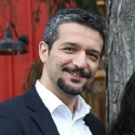SHORT WEBINAR SERIES ON SELECTED TOPICS IN SIGNAL PROCESSING
The Montreal Chapter of the IEEE Signal Processing Society, in collaboration with STARaCom, cordially invites you to attend the following talks, as part of its series of Short Webinars on Selected Topics in Signal Processing.
Date and Time
Location
Hosts
Registration
-
 Add Event to Calendar
Add Event to Calendar
- Contact Event Host
-
Prof. Benoit Champagne, ECE Department, McGill University, Montreal
- Co-sponsored by STARaCom
Speakers
 Dr. Ali Bayat
Dr. Ali Bayat
Auction-Driven Deep Learning-based Resource Allocation for Real-Time Applications in Wireless Networks
Consider a multi-user wireless information transfer system where a multiple-antenna access point (AP) aims to sell its downlink radio access to the end users in an auction premise so that the social welfare of the network or the revenue of the AP is maximized. To this end, the AP holds auctions in which each user can bid for its desired minimum signal-to-interference-plus-noise ratio. Based on the users' channel state information, bids, and service demands, the AP seeks the optimal set of users for which information streams are to be allocated through beamforming. The optimization problem of finding the optimal allocation rule lies in the class of mixed integer nonlinear programming problems for which one can apply Branch-and-Bound (BnB) algorithms to find the solution. However, the BnB algorithms have exponential time complexity which are not practical for real-time applications. To circumvent the time-greediness of such algorithms, we propose a deep neural network architecture, and use it to solve the optimization problem with a good accuracy.
Biography:
Ali Bayat received the M.Sc. degree in Networks and Communications Engineering from the Isfahan University of Technology, Isfahan, Iran, in 2013, and the PhD degree in Telecommunications from the Institut National de la Recherche Scientifique-Energy, Materials and Telecommunications Center (INRS-EMT), University of Quebec, Montreal, Canada, in 2020. He is currently a postdoctoral researcher in Polytechnique Montreal, Montreal, Canada. His research interests include energy-efficient wireless communications, wireless information and power transfer, and application of machine learning in the wireless domain.
Email:
Address:Polytechnique Montreal, , Montreal, Quebec, Canada
 Dr. Furkan Ercan
Dr. Furkan Ercan
High-Throughput does not Contender Energy Efficiency: New Algorithms and Implementations for 5G Polar Codes
Polar codes are a class of error-correcting codes that can provably achieve the channel capacity and have simple encoding and decoding mechanisms. Due to their attractive properties, the interest in polar codes has been increasing rapidly in recent years and they have been adopted for use in the 5th generation (5G) wireless systems standard. Different use cases in 5G prioritize various requirements. For example, ultra-HD video streaming demand high throughput, autonomous driving that require low latency, and battery-operated devices have a focus on energy efficiency. To reach the 5G decoding performance, conventional polar decoder algorithms are complex and costly, which are not desirable for use cases that prioritize throughput and low power. In this talk, we explore alternate simple polar decoding algorithms that can meet the performance of complex algorithms in practical and energy-efficient implementations. We show that unlike the conventional trade-off between the throughput and the energy efficiency, achieving both is possible using the proposed solutions.
Biography:
Furkan Ercan has recently received his Ph.D. degree in Electrical and Computer Engineering from McGill University, Montreal, QC, Canada. Currently, he is with Octasic Inc as an algorithm developer for the 5G physical layer framework. Previously, he worked at Intel Labs in Hillsboro, OR, USA as a visiting researcher, focusing on system-level energy efficiency. His research interests are algorithms and implementations of channel coding, polar codes in 5G wireless communications, practical and energy-efficient hardware architectures. He is the recipient of several scholarships and awards throughout his studies and is actively involved in professional volunteering and leadership activities. He currently serves as the Vice-Chair of the IEEE Montreal Section.
Email:
Address:Octasic Inc, rue Rachel, Montreal, Quebec, Canada

